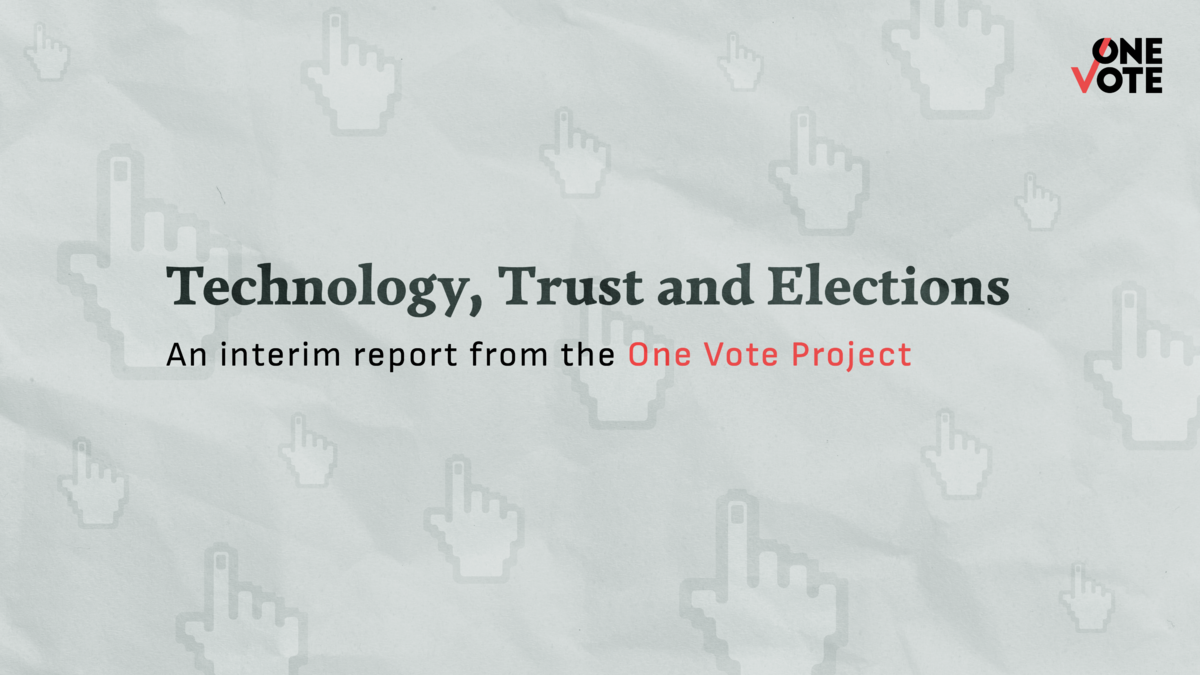
One Vote Report Chapter 1 : Critical Questions
Submitted Nov 17, 2021
Critical Questions
In recent times the proliferation of mobile application (app) ecosystems have influenced a stream of opinion pieces supporting the notion of ‘app based voting’. Often, terms such as ‘internet voting’, ‘mobile voting’ or ‘blockchain voting’ are also used. While they are not exactly used as synonyms, they do indicate the set of systems designed to enable remote voting over the internet with electronic-only recording of votes.
The interest in such online and blockchain voting proposals are rooted in the objective of modernising those systems which are presumed to have inefficiencies1. The bright heat of political support behind such proposals tends to fast-track them without sufficient time being allocated for consultation and evaluation from experts including especially those who are proficient in security. And thus, any enthusiasm in conflating everyday online experiences with an online election should be critically examined from the point of view of tolerance to failures and more importantly, the cost of the failure- should it go unchecked. Elections are a key aspect of the democratic process and any haste can undermine the process leading to long term consequences for the nation2.
There is a growing need to raise awareness among the lay audience - the citizens - the voters about the process of elections and the specific aspects to consider. Far too often the ritual of casting the ballot is considered to be the overriding part of elections in a democracy. This takes away attention from other equally significant aspects of the polling process. As it states - elections are a process with a very uniquely designed set of checks and balances; auditable sequence of steps and with the aim of providing a high level of trust to both the contestants and the voters. At the end of a contest, with the publication of the results, there needs to be good understanding among the stakeholders and participants about the integrity of the process itself.
This interim report does not provide sufficient space or opportunity to extensively examine all the critical questions. Nor does it desire to produce a checklist which can be utilised to self-attest any electoral system with attributes of completeness. These questions are drawn from existing examples of failures in various, specifically internet voting schemes.
- Availability of stakeholder mapping for the electoral process- it is necessary to acquire a complete understanding of the stakeholders in an election. Such activity would include gaining sufficient knowledge about the roles, scope and powers of each of the stakeholders. This helps bring about some degree of understanding of the resilient nature of the system against adversarial attacks from malicious actors and whether the outcome of the election can be controlled by them.
- Completion of threat modeling and evaluation- this is a reasonably expert topic and is likely to be undertaken by professionals who have experience around designing threat models for processes. The desired outcome is to determine the assumptions made in the design of the process and the system and evaluate the efficacy of the various paths in which it can be compromised.
- Assessment of security in systems design - the threat modeling exercise naturally leads to the evaluation of the security features included in the system design and whether the mechanisms are able to prevent violations in security, resistant to coercion but more importantly whether they can detect and report a violation in security. The intended objective is to enable voters and observers to verify that the system is functioning as designed and that the outcomes are resistant to adversarial attacks.
It is important to highlight the principle of ‘evidence based elections’ which is intrinsically coupled with the attribute of transparency. A complete set of evidence enables the public to undertake an examination of the system and arrive at the conclusion based on trust in the system thereby imparting legitimacy to the contest. Evidence based elections make it possible to ensure that “election officials should not only find the true winner(s) of an election, but … also provide the electorate with convincing evidence that they did”3
These 3 aspects along with auditability of elections provides the general reader with a framework within which to examine any current or future processes around election. These are necessary to acquire a working understanding of the electoral process and provide a valuable starting point to demand a reasonable level of transparency in the processes. In the next section we attempt to provide an additional set of aspects which can be utilised to examine any proposal which introduces new technology or enhances the existing technology choices often with vaguely defined outcomes and gains.
Zeynep Tufekci. Online Voting Seems like a Great Idea - Until You Look Closer. Scientific American, 2019. https://www.scientificamerican.com/article/online-voting-seems-like-a-greatidea-until-you-look-closer/?redirect=1 [Online June 1, 2019]. ↩︎
National Academies of Sciences, Engineering and Medicine. Securing the Vote: Protecting American Democracy. The National Academies Press, Washington, DC, 2018. ISBN 978-0-309-47647-8. doi: 10.17226/25120. https://www.nap.edu/catalog/25120/securing-the-vote-protectingamerican-democracy. ↩︎
Sunoo Park, Michael Specter, Neha Narula, and Ronald L Rivest. Going from bad to worse: from Internet voting to blockchain voting. Journal of Cybersecurity, 7(1), 02 2021. ISSN 2057-2085. doi: 10.1093/cybsec/tyaa025. https://academic.oup.com/cybersecurity/article-pdf/7/1/ tyaa025/36276521/tyaa025.pdf ↩︎
Comments
Hosted by
One Vote is an initiative to examine a diverse set of inputs and perspectives regarding the introduction and evolution of technology as part of the elections. We use public discourse, deliberations and reports to raise awareness about this topic for a lay audience. One Vote is designed to enable cr…
more



{{ gettext('Login to leave a comment') }}
{{ gettext('Post a comment…') }}{{ errorMsg }}
{{ gettext('No comments posted yet') }}